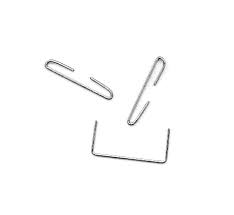staple
英 [ˈsteɪ.pəl]
美 [ˈsteɪ.pəl]
- n. 主要产品;订书钉;主题;主食
- adj. 主要的,大宗生产的;常用的;纺织纤维的
- vt. 把…分级;钉住
使用频率:

记忆方法
1. 大街上苹果产量很高,这个单词也特指纽约(那里苹果多)。
2. staff => staple.
3. the notion being of market stalls behind pillars of an arcade, or else of a raised platform where the king's deputies administered judgment.
4. st- "stand, still, fixed" => staple: 订书钉就是用于把很多纸张固定在一起。同时订书钉也很像贯穿、连接横多纸张的支柱,跟房屋的支柱是贯穿、连接、支撑很多楼层是一样的。
5. 主食:staple food
2. staff => staple.
3. the notion being of market stalls behind pillars of an arcade, or else of a raised platform where the king's deputies administered judgment.
4. st- "stand, still, fixed" => staple: 订书钉就是用于把很多纸张固定在一起。同时订书钉也很像贯穿、连接横多纸张的支柱,跟房屋的支柱是贯穿、连接、支撑很多楼层是一样的。
5. 主食:staple food
中文词源
staple 主要商品,主要产品,主食,主要的,基本的
来自盎格鲁法语 estaple 市场,特指官方指定的销售某些特定商品的市场,来自古法语 estaple,
英语词源
- staple
-
staple: English has two distinct words staple, but they come from a common ancestor – prehistoric Germanic *stapulaz ‘pillar’. This evolved into English staple [OE], which at first retained its ancestral meaning ‘post, pillar’. The modern sense ‘U-shaped metal bar’ did not emerge until the end of the 13th century, and the details of its development from ‘pillar’ are obscure.
The Middle Low German and Middle Dutch descendant of *stapulaz was stapel, which had the additional meaning ‘market, shop’ (presumably from the notion of a stall situated behind the ‘pillars’ of an arcade). This was borrowed into Old French as estaple, which in turn gave English staple ‘market’ [15], hence ‘principal commercial commodity’.
- staple (n.1)
- "bent piece of metal with pointed ends," late 13c., from Old English stapol "post, pillar, trunk of a tree, steps to a house," from Proto-Germanic *stapulaz "pillar" (cognates: Old Saxon stapal "candle, small tub," Old Frisian stapul "stem of a tooth," Dutch stapel "a prop, foot-rest, seat," Middle Low German stapel "block for executions," German Stapel "stake, beam"), from *stap-, from PIE stebh- (see staff (n.)).
A general Germanic word that apparently evolved a specialized meaning in English, though OED finds the connection unclear and suggests the later sense in English might not be the same word. Meaning "piece of thin wire driven through papers to hold them together" is attested from 1895. - staple (n.2)
- "principal article grown or made in a country or district," early 15c., "official market for some class of merchandise," from Anglo-French estaple (14c.), Old French estaple "counter, stall; regulated market, depot," from a Germanic source akin to Middle Low German stapol, Middle Dutch stapel "market," literally "pillar, foundation," from the same source as staple (n.1), the notion perhaps being of market stalls behind pillars of an arcade, or else of a raised platform where the king's deputies administered judgment.
The sense of "principle article grown or made in a place" is 1610s, short for staple ware "wares and goods from a market" (early 15c.). Meaning "principle element or ingredient in anything" is from 1826. Meaning "fiber of any material used for spinning" is late 15c., of uncertain origin, and perhaps an unrelated word. - staple (v.)
- late 14c., "to fix with a (large) staple," from staple (n.1). In the wire paper fastener sense, by 1898. Related: Stapled; stapling.
权威例句
- 1. It is well known that bamboo shoots are a panda's staple diet.
- 竹笋是熊猫的主要食物,这是人所共知的。
- 2. Rice is the staple food of more than half the world's population.
- 稻米是全世界一半以上人口的主食。
- 3. Fish is a staple in the diet of many Africans.
- 鱼是很多非洲人饮食中的一种主食。
- 4. The shed was secured by a hasp and staple fastener.
- 棚屋由一个搭钩和U型扣件固定着。
- 5. The staple crop is rice.
- 主要农作物为水稻。
